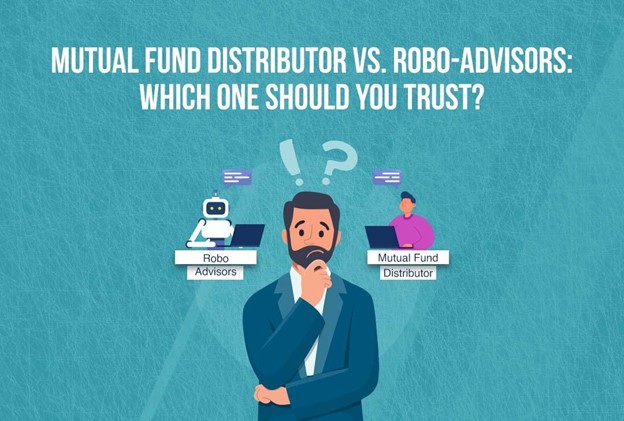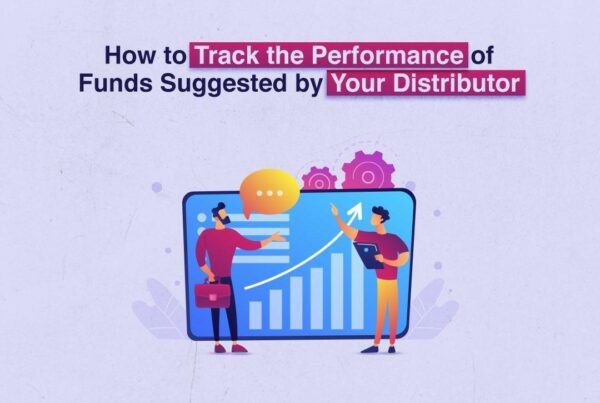
The investment world has transformed dramatically in the last decade. What was once driven almost entirely by human expertise is now heavily influenced by algorithms and artificial intelligence.
For anyone looking to invest in mutual funds, one key question arises: Should you rely on the guidance of a human mutual fund distributor (MFD), or put your trust in robo-advisors?
The New-Age Dilemma
The mutual fund industry has seen two parallel shifts. On one side, fintech platforms have made investing as easy as shopping for a product online – simple, quick, and entirely digital.
On the other, mutual fund distributors have also grown in number, with many investors continuing to prefer personal, human guidance.
Adding to this mix are robo-advisors – digital platforms that recommend investments based on algorithms, usually after analyzing your risk profile and financial goals.
For today’s investor, this creates a crucial decision point:
Do you go with the relationship-driven, customized approach of a mutual fund distributor, or choose the low-cost, automated efficiency of a robo-advisor?
Understanding how they differ is the first step toward finding the right fit for your financial journey.
What Are Robo-Advisors?
Robo-advisors are digital platforms that use algorithms to recommend and manage investments.
Instead of relying on face-to-face meetings with a financial advisor, these platforms analyze your goals, risk appetite, and investment horizon to create a suitable portfolio, completely online.
The idea is simple: automate as much of the investing process as possible, from picking funds to rebalancing your portfolio when markets shift. This makes robo-advisors affordable, fast, and accessible at any time – qualities that appeal especially to new-age investors.
In India, robo-advisory platforms are required to be registered with SEBI as Investment Advisors, ensuring they operate under regulatory oversight.
Key Advantages of Robo-Advisors
- Low Cost: Fees are usually much lower than traditional advisory services.
- Easy to Access: Everything happens online, often with minimal paperwork and low entry amounts.
- Automation: From asset allocation to rebalancing, most steps are handled by the system without human intervention.
- Goal-Oriented: Many platforms first ask about your financial objectives and risk tolerance, then suggest a matching investment strategy.
- Low Minimum Investment
Investors with small amounts can start without large initial capital. Some platforms even allow accounts with no minimum balance. - Tax Efficiency
These platforms help minimize taxes on capital gains, allowing investors to keep more of their returns.
The Limitations
While robo-advisors bring convenience, they come with their own limitations
- Limited Personalization: Recommendations are based on algorithms and may not suit highly specific needs.
- No Human Touch: In volatile markets or during financial stress, there’s no one to talk to for reassurance or deeper guidance.
- Complex Needs Uncovered: Advanced planning—like business succession, estate planning, or advanced tax strategies—may need human expertise.
- India-Specific Limitations: Unlike global markets where automation is near total, Indian robo-advisors mostly recommend mutual funds and still require manual transaction approvals.
What Are Mutual Fund Distributors?
Mutual fund distributors (MFDs) are licensed professionals who help investors choose, purchase, and manage mutual funds.
Unlike robo-advisors that rely purely on algorithms, MFDs combine industry expertise with a personal touch.
They understand your financial situation, listen to your objectives, and then suggest funds that align with your needs.
In India, MFDs are regulated by the Association of Mutual Funds in India (AMFI).
To operate, they must clear the NISM Series V-A: Mutual Fund Distributors Certification Examination and register with AMFI.
This ensures that investors receive guidance from certified professionals who are trained to provide reliable and compliant services.
Key Advantages of Mutual Fund Distributors
- Personalized Guidance: MFDs take into account your unique circumstances, such as income, family needs, or future objectives – before suggesting funds.
- Human Connection: In times of market volatility, an MFD can offer reassurance and explain strategies, something algorithms cannot do.
- End-to-End Assistance: From paperwork and compliance to portfolio reviews, distributors handle the practicalities so investors can focus on their financial objectives.
- Long-Term Relationship: Over time, MFDs get to know your preferences and evolving financial needs, offering suggestions that adapt as your life changes.
- Regulated & Certified: Their certification ensures a standard of knowledge and accountability in guiding investors.
Limitations of MFDs
- Higher Costs: Human guidance may involve commissions, making them slightly more expensive than robo-advisors.
- Subjective Bias: Like any human, distributors may sometimes be influenced by commissions or personal preferences when suggesting funds.
With mutual fund adoption growing rapidly in smaller towns and cities, MFDs act as a bridge – bringing financial awareness and hand-holding first-time investors through the process.
Finding a trustworthy mutual fund distributor can be challenging these days. With Moolaah, you can log in as an investor and access a vast list of AMFI-registered mutual fund distributors (MFDs). Review their experience and expertise, select one – or multiple – distributors, and start investing with their guidance to grow your investments with confidence.
Mutual Fund Distributors vs. Robo-Advisors
| Factor | Mutual Fund Distributors (MFDs) | Robo-Advisors |
| Regulation | Certified through NISM V-A & registered with AMFI | Must be registered with SEBI as Investment Advisors |
| Advice Approach | Human-driven, with personalized suggestions | Algorithm-based, using standard risk–return models |
| Flexibility | Can adapt suggestions as objectives and circumstances change | Limited to pre-set models and algorithms |
| Fees | Often commission-based – MFDs may earn through commissions from mutual funds sold. | Follow a Fee-Only Model – clients pay a transparent fee for advice; no commissions involved |
| Support | Provide emotional reassurance & hand-holding during volatile market | No human interaction, self-guided experience |
| Cost | Slightly higher due to commissions/fees | Generally lower, cost-efficient |
| Adoption in India | Widely trusted, especially in smaller towns & first-time investors | Growing among younger, tech-savvy investors |
Who Should Opt for What?
| Investor Type | Better Fit: MFDs | Better Fit: Robo-Advisors |
| First-time investors seeking personalized guidance | ✅ Yes | ❌ Not ideal |
| Tech-savvy beginners with small amounts | ❌ May not be necessary | ✅ Yes |
| Those who value a human point of contact to review their portfolio and offer reassurance/suggest rebalance during volatile times | ✅ Yes | ❌ Not available Often follow preset rules for automated portfolio rebalancing |
| Cost-sensitive investors prioritizing low fees | ❌ Slightly higher cost | ✅ Yes |
| Long-term relationship-driven investors | ✅ Yes | ❌ No |
Are Mutual Fund Distributors Outdated?
The Indian robo-advisory market has been growing steadily, attracting young investors who prioritize cost-effective solutions. At the same time, direct plans in mutual funds, which eliminate distributor commissions, have also been increasing in popularity.
According to Statista, assets under management (AUM) of robo advisory in India is expected to grow at a CAGR of 4.28% between 2025–2029, reaching approximately US$27.20 billion (≈2.396 lakh crore) by 2029.
In the same period, the number of robo-advisory users in India is projected to reach 3.272 million.
Regarding direct plans, as of March 2025, they account for 30% of the mutual fund industry’s equity AUM, up from 21% in March 2020—signalling a clear trend towards low-cost, self-directed investing.
But MFDs Still Matter
Despite these trends, mutual fund distributors continue to demonstrate their value.
Regular plans—invested through MFDs—show stronger investment discipline: only 7.7% of direct plan AUM has been held for over five years, compared to 21.2% in regular plans.
This highlights the ongoing importance of professional guidance, especially for retail investors who may be prone to reactive investment behavior.
Recent AMFI data reinforces this point. An analysis of AUM disclosures shows that 3,158 mutual fund distributors qualified as top distributors in FY 2025, up from 2,499 in FY 2024 and 1,781 in FY 2023.
These top distributors collectively managed Rs. 25.35 lakh crore in AUM (more than 10 times the projected AUM of robo-advisors in 2029) – and earned a gross income of Rs. 21,106 crore in FY 2025.
This underscores the continued relevance and effectiveness of human presence in India’s investment landscape.
While younger investors are increasingly moving towards cost-efficient, automated solutions, those who have experienced the value of trustworthy, personalized guidance continue to rely on MFDs for their investment needs.
Conclusion
Robo-advisors and MFDs both have their pros and cons.
If you seek a low-cost, automated investment solution, robo-advisors can be a good fit.
However, if you value human guidance, personalized suggestions, and long-term investment discipline, mutual fund distributors remain unmatched in helping you navigate the complexities of investing.
Looking for trusted investment guidance?
With Moolaah, access a curated list of certified mutual fund distributors, choose the one(s) that match your needs, and invest confidently with their expert support.


